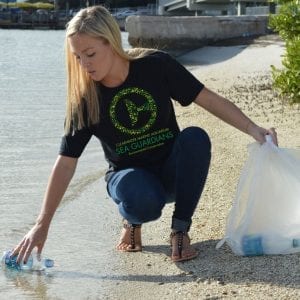Helping marine animals like Winter
may be easier than you think!
On the Beach

- Litter is lethal: When visiting the beach, please leave only your footprints behind. Marine animals, such as dolphins, sea turtles and shore birds can become entangled in trash or even mistake it for food. This can lead to illness, injury or even death. Not only that, but certain trash can take a very long time to break down, including plastic, which takes up to 400 years.
- Bring a bucket: Buckets are great for building sandcastles, but they can also be used for collecting litter that you find on the beach.
- Watch what you’re “dune”: Sand dunes play a critical role in protecting inland areas from wind and waves. Moreover, they serve as habitat for various species of nesting birds and other animals. Whenever possible, avoid trekking through the dunes and use walkways instead.
- Responsible Critter Viewing: Our coastal shores serve as a home for an array of creatures. When you catch a glimpse of one of these animals, please make sure to enjoy them but only from afar. Do not interact with them or feed them, as this can cause more harm than good. What’s more, they may become immune to people, which can increase their risk of being injured by humans and manmade items, such as fishing gear. If you do find an animal that is ill, injured or even deceased, then immediately contact law enforcement, a park ranger or a local wildlife rehabilitator.
On the Water
- Practice catch and release fishing: Overfishing is a significant threat to fish populations worldwide so every fish counts, including the fish on your line. Help protect fish and other animals that may become accidentally “hooked” by using barbless single hooks, C-hooks and handling the animal as little as possible.
- Be seafood conscious: Be mindful of what you eat. Before ordering or preparing your next seafood meal, check out the “Seafood Watch” app on your smart phone. This app will let you know what seafood is most sustainable and best to eat.
- Don’t leave fishing lines behind: Fishing line can harm marine life through entanglements and ingestion. Cut line into small pieces and dispose in the garbage or recycle them at monofilament recycling stations that are usually found on piers and public beaches.
At Home
- Save water: Whenever you can, use less. At home, that means turning off your tap while brushing teeth, taking shorter showers and watering your lawn only when needed and during the early morning hours.
- Recycle items from your school, work and home: Most communities have access to recycling centers for plastic, cans, paper and glass. Encourage your school, work and home to recycle and purchase recycled materials.
- Don’t put harmful chemicals down the sink: These chemicals ultimately end up in our waterways. Limit your use of phosphates, as they can promote algae blooms, which can harm marine life and their environments. You can also switch to more environmentally friendly products, such as soap or detergent with low phosphate content.
Around Town
- Educate yourself: Learn all you can about marine life and conservation. Visit local parks, museums and aquariums to further your marine knowledge. Make a wave, and share with your family and friends about why and how they can help protect the ocean!